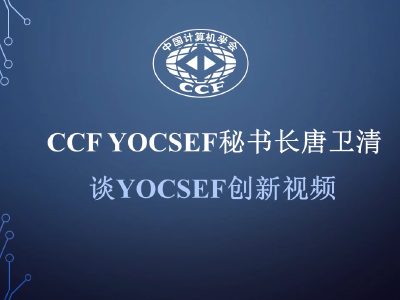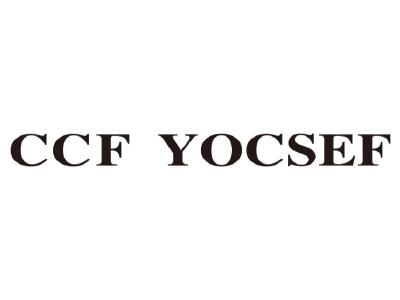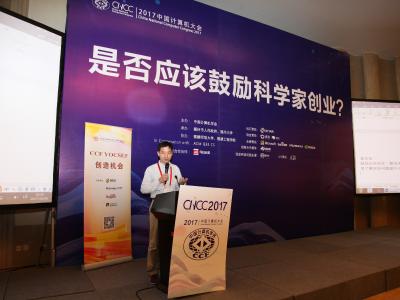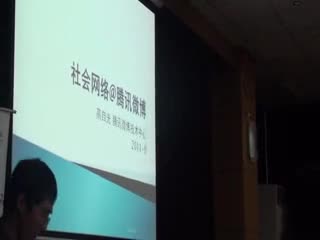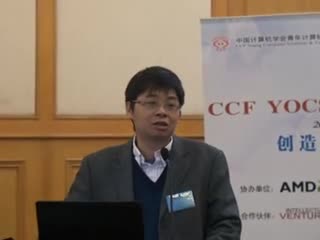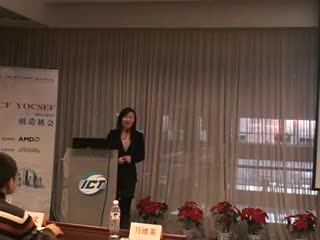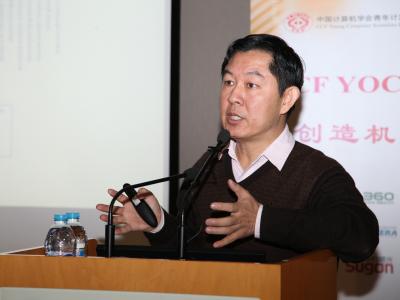CCF YOCSEF桂林分论坛
中国计算机学会青年计算机科技论坛-桂林分论坛
CCF Young Computer Scientists & Engineers Forum-Guilin Branch
时 间:2016年7月25日全天
地 点:桂林电子科技大学金鸡岭校区7217室
参会人员:CCF YOCSEF总部荣誉委员、桂林分论坛主席会议成员、AC委员、委员
日程安排
|
时间 |
项目 |
备注 |
|
|
7.25 上午 报告会 |
8:00-8:20 |
会议签到 |
|
|
8:20-8:30 |
致欢迎辞 |
执行主席:蔡国永 |
|
|
8:30-9:20 |
学术报告1: Social Spammer Detection: A Data Mining Perspective |
报告人:Xia Ben Hu |
|
|
9:20-10:10 |
学术报告2: A Probabilistic Framework of Transfer Learning |
报告人:Na Zou |
|
|
10:10-10:30 |
茶 歇 |
|
|
|
10:30-11:15 |
学术报告3: Attributed Network Embedding |
报告人:Xiao Huang |
|
|
11:15-12:00 |
学术报告4: Accelerated Anomaly Dete- ction in Attributed Graphs |
报告人:Ninghao Liu |
|
|
7.25 下午 换届 |
14:15-14:50 |
CCF YOCSEF规则、文化相关培训 |
总部荣誉委员:何万青 |
|
14:50-15:20 |
2015届桂林主席会议成员工作汇报 |
人均4分钟时间 |
|
|
15:20-15:30 |
茶 歇 |
|
|
|
15:30-15:50 |
授予2016届桂林分论坛主席会议成员证书仪式 |
总部荣誉委员:操晓春 |
|
|
15:50-16:00 |
合影留念 |
|
|
|
16:00-16:30 |
2016届桂林主席会议成员就职演讲 |
人均4分钟时间 |
|
|
16:40-17:30 |
室外趣味活动 |
|
|
|
18:00-19:30 |
晚宴 |
|
|
|
7.25 晚上 论坛 |
19:40-21:10 |
论坛主题:信息化给东盟与壮乡旅游业带来的机遇与挑战 |
执行主席:谢晓兰 |
学术报告1:Social Spammer Detection: A Data Mining Perspective
内容摘要:With the growing popularity of social media, social spamming has become rampant on all platforms. Many (fake) accounts, known as social spammers, are spammers are a special kind of spammers who coordinate among themselves to launch attacks such as distributing ads to generate sales, disseminating pornography and viruses, executing phishing attacks, or simply sabotaging a system's reputation. In this talk, I will introduce a novel and systematic analysis of social spammers from data mining perspective to tackle the challenges raised in social media data for spammer detection. Specifically, I will formally define the problem of social spammer detection and discuss the unique properties of social media data that make this problem challenging. By analyzing the two most important types of information, network and content information, I will introduce a unified framework by collectively using heterogeneous information in social media. To tackle the labeling bottleneck in social media, I will show how we can take advantage of the existing information about spam in email, SMS, and on the web for spammer detection in microblogging. I will also present a solution for efficient online processing to handle fast-evolving social spammers.。
讲者简介:Xia "Ben'' Hu,任美国德州农工大学数据挖掘实验室主任、计算机学院助理教授(终身教职系列)、博士生导师。长期从事大数据,数据挖掘和人工智能研究,在相关顶级国际会议及期刊(CCF A类, B类,包括WWW, SIGIR, KDD, WSDM, IJCAI, AAAI, CIKM, ICDM, SDM, TBD, KAIS等)发表论文60余篇,他引超过1200次。获WSDM'13 国际会议最佳学生论文提名,亚利桑那州立大学校长奖,IEEE Atluri学者奖。长期担任国际顶级期刊编委(包括TKDE, TKDD, TOIS, TIST等),及顶级国际学术会议程序委员会委员(包括WWW, SIGIR, KDD, IJCAI, AAAI等)。
学术报告2:A Probabilistic Framework of Transfer Learning
内容摘要:Transfer learning refers to statistical machine learning methods that integrate the knowledge of source domain and the data of target domain in an appropriate way, in order to develop a model for the target domain that is better than a model using the data of the target domain alone. Transfer learning emerged because classic machine learning, when used to model different domains, has to take on one of two mechanical approaches. That is, it will either assume the data distributions of the different domains to be the same and thereby developing one model that fits all, or develop one model for each domain independently. Transfer learning, on the other hand, aims to mitigate the limitations of the two approaches by accounting for both the similarity and specificity of related domains. My objective is to develop new transfer learning methods and demonstrate the utility of the methods in real-world applications. Furthermore, I apply the proposed transfer learning approach to modeling of degenerate biological systems. Degeneracy is a well-known characteristic, widely-existing in many biological systems, and contributes to the heterogeneity, complexity, and robustness of biological systems. In particular, I study the application of one degenerate biological system which is to use transcription factor (TF) binding sites to predict gene expression across multiple cell lines.
讲者简介:Na Zou,joined the Industrial & System Engineering Department at Texas A&M as instructional assistant professor in 2016. She obtained her Ph.D. in Industrial Engineering from Arizona State University. She also received a master degree and a statistics certificate from Arizona State University. Her research interests include statistical machine learning of large scale, dynamic and networked data with applications in health care, brain science, and process control. She has several papers published in top journals such as Technometrics, IIE Transaction and Journal of Cerebral Blood flow & Metabolism. She is a recipient of the Irv Kaufman Award from IEEE foundation in 2015.
学术报告3:Attributed Network Embedding
内容摘要:Attributed networks are ubiquitous in many real-world applications, such as social media and academic networks. Different from plain networks in which only node-to-node interactions and dependencies are observed, each node in the attributed network is often associated with a rich set of data that records its attributes. It becomes increasingly promising to advance the learning performance by jointly exploiting geometrical and attribute structures. Motived by dimensionality reduction, a number of algorithms have been proposed to exploit the potential of embedding it into a continuous low-dimensional space. In this talk, I will formally define attributed network embedding, and introduce several state-of-the-art methods, including one of our current work, i.e., large-scale attributed network embedding (LANE). I will show you how can these methods incorporate node attributes and network topical structure into a unified latent representation, especially how can our proposed framework make it efficient and scalable.
讲者简介:Xiao Huang is a second-year Ph.D. student in the Computer Science and Engineering department of Texas A&M University. He is currently working at the Data Analytics at Texas A&M (DATA) Lab under the supervision of Dr. Xia Hu. He received his master degree in Electrical Engineering from Illinois Institute of Technology in 2015, and bachelor degree in Electrical and Computer Engineering from Shanghai Jiao Tong University in 2012. His research interests lie in network embedding, social media mining, machine learning algorithms and low-rank approximation.
学术报告4:Accelerated Anomaly Detection in Attributed Graphs
内容摘要:Anomaly detection, which aims at discovering objects or events significantly different from the background, has been widely used in many applications such as spammer detection, network failure detection and video surveillance. While attributed graph has become more and more popular in presenting many large-scale information systems such as social media and medical systems, it motivates us to investigate efficient algorithms of anomaly detection that can incorporate attribute information and process large graphs. In this talk, I will introduce an accelerated algorithm for detecting community-based anomalies from graphs with node attributes information. Specifically, I will formally define the community anomalies. By combing two types of information, structure information and attribute information, I will also show how to partition the graph into meaningful communities with overlaps. The coherence between attributes and communities is summarized as part of the outcome, and will serve as the basis for spotting abnormal objects. To process large graphs, I will present a distributed algorithm by taking advantage of the sparseness of data and parallel computing framework.
讲者简介:Ninghao Liu is currently a Ph.D. candidate in Computer Science at Texas A&M University in the Department of Computer Science and Engineering. He received his M.S. in Georgia Institute of Technology, and B.S. from South China University of Technology. He works as a research assistant at Data Analytics at Texas A&M (DATA) Lab directed by Dr. Xia “Ben” Hu. His research interest is in data mining and machine learning, and their applications in social informatics, spammer detection and anomaly detection. One of his papers won the Best Paper Award in IEEE ICCC 2014.
论坛主题:信息化给东盟与壮乡旅游业带来的机遇与挑战
主要内容:活动主要围绕大数据时代脑机智能发展能拥有什么样的机遇、同时又将面临哪些挑战等热点问题进行交流,其中涉及的内容可能包括大数据可计算、群体智能可学习、多态跨域知识可关联,面向脑智能的数据科学、智能科学、认知科学等。并对以数据建模、群智学习、知识图谱为重点的大数据科学理论体系,以及组织、自适应、自生长的脑机智能技术系统进行深入探讨。
主办: CCF YOCSEF桂林、桂林电子科技大学计算机与信息安全学院
执行主席:
蔡国永,博士,教授,桂林电子科技大学计算机科学与工程学院党委书记。CCF YOCSEF桂林2015执行主席,CCF高级会员、CAAI高级会员、ACM会员。
CCF YOCSEF桂林2016主席会议成员:
主 席:谢晓兰
副主席:唐振军,何倩,沈良恒
学术秘书:王日凤,张灿龙
参加人员:有兴趣的老师、研究人员、学生。
报名请联系:蔡国永 (QQ:1140483447; Tel:13687731971 )




